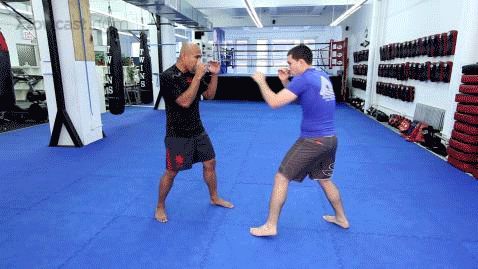For someone who uses the boxing guard (open the front door and close both side doors), and force you to punch in between his arms, this combo is not suitable.Still seems pretty low percentage.

Follow along with the video below to see how to install our site as a web app on your home screen.
Note: This feature may not be available in some browsers.
For someone who uses the boxing guard (open the front door and close both side doors), and force you to punch in between his arms, this combo is not suitable.Still seems pretty low percentage.

Yes...this GIF sums up what I have been saying. Parrying inside out is a bad idea. I'm not sure if holding a different guard would help at the point your parrying arm is already out there.For someone who uses the boxing guard (open the front door and close both side doors), and force you to punch in between his arms, this combo is not suitable.

Agree with you there.Parrying inside out is a bad idea.
Plus two grabs.Complicate?
Besides the most basic boxing combo
- jab, cross,
the only difference is to add in a pull after the jab. The pull, cross is still 1 move.
- jab, pull, cross.
It's not really the same move, though. It looks the same, but only works the same if his arm is limp. If his arm is active, you need entirely different mechanics - I think that's DB's point about how you're going to pull that back. Pulling back my empty arm is very low energy. Adding in his arm, which he's trying to pull in his direction, means I now need both the structure and balance to offset his structure and balance for that pull to move his arm even a bit.After your jab, you have to pull your hand back any way. Whether you will pull back with empty hand, or pull back with something (your opponent's arm), it's the same move. Will it be better to pull back with something instead of to pull back with empty hand?
The jab is yours - you're trapping a block in this scenario.So catching a jab and using it to lever a guy?
Not to belittle your point, but you would need to be faster than the other guy by orders of magnitude, and have luck on your side.
There's generally very little time to react to a punch, especially the fastest of them. Trying to catch it at the expense of leaving yourself wide open for the rear hand shot that's probably coming on the next half beat seems pretty risky to me.
For a big round strike, it's a viable option (just have to be aware the other hand is probably next). I've always found it odd how often MA systems teach mostly straight strikes and practice against mostly round ones.Agree with you there.
Why do you think the "inside out" block exist in many MA systems?
I would say that is because theory crafting is easy when you don't pressure test.Agree with you there.
Why do you think the "inside out" block exist in many MA systems?

I think that's part of it. Also, most of what's being blocked is straight punches (jab, cross). Hooks don't usually get "blocks" - they get absorbed by the guard, instead. If you blocked a hook separately, you'd block it inside-out unless you manage to get out of range so you can parry it across from the outside. But hooks aren't a good choice for trying to block. If more roundhouse punches were thrown, you'd see more inside-out blocks, IMO.It seems to me that the reason that we don't see "inside out" block used in MMA because most MMA fighters use the boxing guard - open the front door, close both side doors, force his opponent's punch to come in between his arms. Do you guys agree?
In this clip, we can only see "outside in" block.

